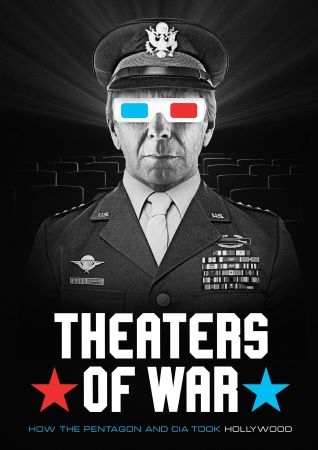
Theaters of War 2022
Distributed by Media Education Foundation, 60 Masonic St., Northampton, MA 01060; 800-897-0089
Produced by Matthew Alford, Tom Secker, and Sebastian Kaempf
Directed by Roger Stahl
Streaming, 87 mins
College - General Adult
Filmmaking; Military; Propaganda
Date Entered: 03/21/2023
Reviewed by Susannah Benedetti, Associate Director, University of North Carolina WilmingtonTheaters of War shines a light on the little-known control that the Department of Defense and the CIA exert on films, television and cable series, and documentaries in exchange for military hardware, locations, personnel, and technical advising. By illustrating the national security state’s page-by-page script oversight and ability to stop productions in their tracks, the filmmakers present a wide-ranging and insidious PR system that can be considered politicized whitewashing at best and censorious propaganda at worst.
Director Roger Stahl sets out to determine just how far this control reaches and discovers that thousands of scripts have been doctored under Pentagon and CIA contracts in order to market and glorify the American military. From expected fare like Top Gun and Pearl Harbor to Ferris Bueller’s Day Off and Pitch Perfect 3, productions are marketed as pure entertainment without clear acknowledgement of significant governmental influence. The original Department of Defense mandate to consult with entertainment productions to ensure authenticity and dignity shifted after the 1970s to drive script and story changes with a focus on marketing, boosterism, and recruiting. Internal database entries laud Top Gun as having “completed rehabilitation of the military’s image, which had been savaged by the Vietnam War,” and approvingly describe audiences for Lone Survivor as paying to “voluntarily sit through a two-hour informercial about the Army Special Forces.”
Featuring filmmakers including Jerry Bruckheimer, Michael Bay, and Oliver Stone, as well as media scholars, journalists, representatives from the Pentagon Entertainment Media office, combat veterans, and officers of the armed forces, the film explores how the Pentagon and CIA handle productions that include sobering elements such as military failures, war crimes, torture, friendly fire, and veterans’ mental health struggles. Often with a “denied” rubber stamp, as Stahl details. Topics like these are referred to internally as “showstoppers” and must be removed or substantively changed or run the risk of shutting down cooperation altogether. Changes have included minimizing institutional racism in The Tuskegee Airmen down to ‘one bad apple’ and reframing the debacle of Black Hawk Down as a redemptive rescue story. Some productions proceed without the contract and pay infinitely more to obtain the necessary hardware, experts, and locations, and the filmmakers also describe titles that die on the vine; one memo about the rejected script Countermeasures sniffs, “There is no reason to denigrate the White House or remind the public of the Iran-Contra Affair.”
The film is engaging throughout, presenting eye-opening emails and memos stating the Pentagon’s case in black and white. Co-producers Matthew Alford and Tom Secker detail their Sisyphean efforts to gain access to relevant Department of Defense documents and data through dogged Freedom of Information Act requests. This approach brings the viewer deeper into the story and illustrates the tenacious efforts it has taken to uncover the depth and breadth of the program which, as Oliver Stone notes, is “a gigantic iceberg.”
Theaters of War is a powerful and well-researched expose of the government forces at work behind thousands of otherwise innocuous entertainment productions. The filmmakers ask tough questions about a veritable propaganda machine that routinely fetishizes American military excesses in vehicles marketed as simply the newest DC, Marvel, or Transformers installment, and extends to product placement on The Rachael Ray Show. They make the compelling argument that the public deserves to know the scope of impact so that they can decide whether or not to watch productions shaped by the national security state. The film ends with a question. How would critical media viewers react if productions from Zero Dark Thirty to Cake Boss included upfront disclaimers: “The following government agencies have influenced the production of this program?”
Published and licensed under the Creative Commons Attribution 4.0 license. Anyone can use these reviews, so long as they comply with the terms of the license.